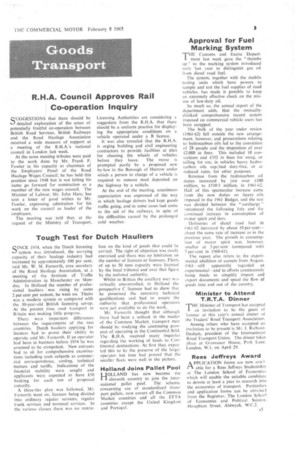Tough Test for Dutch Hauliers
Page 7

If you've noticed an error in this article please click here to report it so we can fix it.
SINCE 1954, when the Dutch licensing system was introduced, the carrying capacity of their haulage industry had increased by approximately 100 per cent, said Mr. W. M. Farnorth, area secretary of the Road Haulage Association, at a meeting of the Institute of Traffic Administration in Manchester on Monday. In Holland the number of professional hauliers was rising by some 2 per cent per annum, he went on. Theirs was a modern system as compared with the 30-year-old British licensing set-up. At the present time road transport in Britain was making little progress.
There were important differences between the requirements of the two countries, Dutch hauliers applying for licences had to prove their ability to operate, said Mr. Farnorth. If an operator had been in business before 1954 he was assumed to be competent. New entrants had to sit for comprehensive examinations including such subjects as commercial correspondence, costing, technical matters and tariffs. Indications of the financial stability were sought and applicants were expected to have £50 backing for each ton of proposed capacity.
A three-tier plan was followed, Mr. Farnorth went on, licences being divided into ordinary regular services, regular trunk services and terminal services. 'In the various classes there was no restric tion on the kind of goods that could be carried. The right of objection was rarely exercised and there was no limitation on the number of licences or licensees. Fleets of up to 50 tons capacity were licensed by the local tribunal and over that figure by the national authority.
Whilst in Britain the ancillary user was virtually uncontrolled, in Holland the prospective C licensee had to show that he possessed the necessary technical qualifications and had to assure the authority that professional operators were not available to do the work.
Mr. Farnorth thought that although there had been a setback in the matter of the Common Market, transport men should be studying the continuing prospect of operating in the Continental field. The R.H.A. received many inquiries regarding the working of loads to Continental destinations. At first they expected this to be the preserve of the larger operator but time had proved that the smaller fleets were well in the picture.
Holland Joins Pallet Pool 11OLLAND has now become the
eleventh country to join the international pallet pool. The scheme, concerning use of standardized transport pallets, now covers all the Common Market countries and all the EFTA countries except the United Kingdom and Portugal.




















































































































